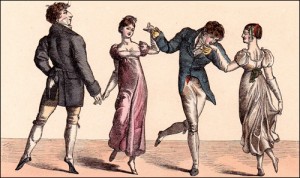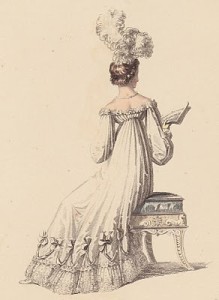
Dating in Regency England was very different. For one thing, it was called courting or wooing. But most importantly, a young lady of good breeding who wished to keep her reputation pristine so she would be a candidate for marriage never, ever put herself alone with a man. (The double standard is, of course, that the man was expected to have “sown his wild oats” and could have a very sullied reputation and still be considered a good match if he were wealthy and well-connected enough.) Therefore, courting was a very public affair.
First, they needed an introduction by a mutual friend before conversing. They often met at balls which were THE places to meet those of similar social backgrounds, but they might also meet at a dinner party, soiree, musicale, or even the opera or the theater.
If the man wished to get better acquainted with the lady he’d met, he might send her flowers the next day (but never gifts or letters), and later pay a visit upon the family during their “at home” hours where her mother or aunt or other chaperone would be present. He might take her for a stroll in one of the walking parks, with a chaperone close at hand. He might even take her riding on horseback or in an open carriage—open being the operative word since riding in a closed carriage could ruin her reputation as quickly as being alone in a house with a man.

Such courting practices may sound rigid and even sterile to the modern-day woman, but I think it leaves so much open. For one thing, they relied on witty conversation rather than getting physical to get to know each other. And since the courting practices were pretty predictable, a man had to use creativity to impress a lady.
Once he felt secure she returned his affections, the gentleman would make an appointment with the girl’s father and formally ask for her hand in marriage. His income would be scrutinized and they would draw up a prenuptial agreement called a marriage settlement which included her pin money, dress allowance, jointure, and other ways he’d provide for her, as well as what dowry would go to the man. With all that settled, the father would break the news to the girl and the wedding preparations would commence.

My tagline is ‘Believe in happily ever after’ because I do believe in it. Do you believe in happily ever after?
Love and Courtship in Regency England posted first on http://donnahatchnovels.tumblr.com/
No comments:
Post a Comment